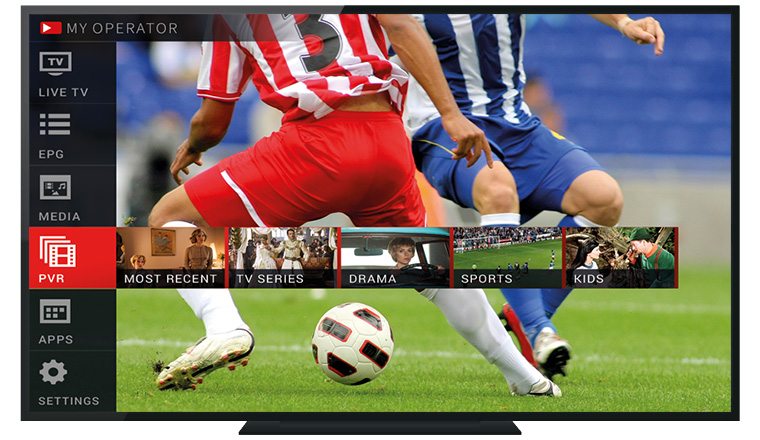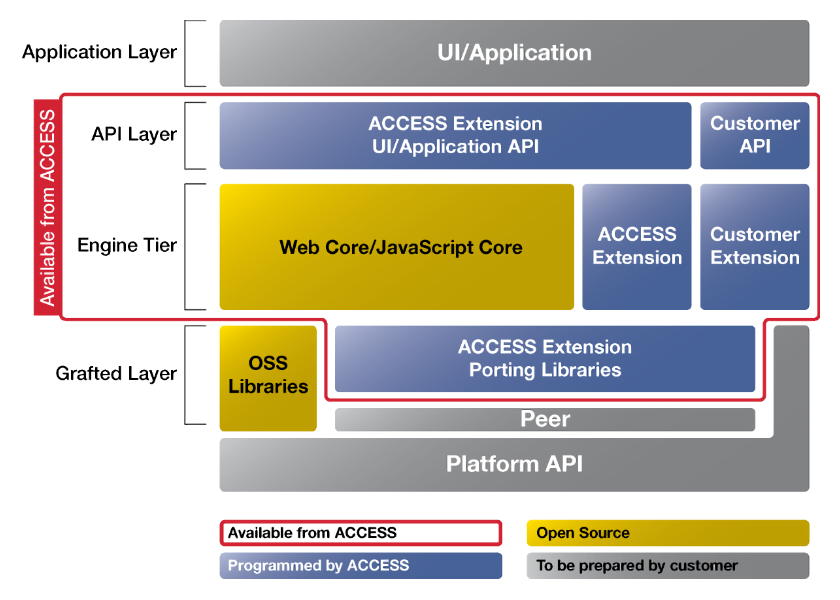NetFront™ Browser NX DTV Profile is a high performance WebKit-based HTML5 browser that features efficient memory usage and high stability. With support for worldwide DTV standards and specifications, including HbbTV 1.5, HbbTV 2.0.1, Freeview Play 2017, ARIB STD-B62/TR-B39 (2nd generation digital broadcasting) and CE-HTML, NetFront Browser NX DTV Profile is an ideal solution for connected TVs, set-top boxes, HDMI sticks and automotive infotainment systems.

NetFront™ Browser NX DTV Profile was designed and optimized to enable standards based connected entertainment services on resource constrained STB platforms. Legacy STB platforms can be enhanced with HTML5 capabilities to provide consumers with access to connected services without the need to change hardware platform.
Typically, applying in-house solutions to legacy platforms can lead instability due to the constrained of the embedded environment. They may also have platform-dependent implementation/porting layers and lack DTV-specific extensions needed to launch services. This leads to a large engineering investment by SoC vendors, set-top box manufacturers and middleware providers both in the initial development phase and, perhaps more importantly, for ongoing maintenance of the bespoke solution. NetFront™ Browser NX DTV Profile is provided as an embedded SDK pre-configured for the target platform and incorporates ACCESS technologies deployed in over 1.5 billion units worldwide. One feature is enhanced stability in low memory situations, enabling devices to perform for longer without needing to be rebooted. Also, flexible porting APIs enable the solution to target multiple STBs and System-on-Chip (SoC) vendors whilst providing a compatible environment and still allowing access to hardware accelerated functions. ACCESS SDKs can support standardized APIs such as OpenGL-ES for higher end platforms and software engines such as Cairo for lower power platforms without hardware graphics processing units (GPUs).
NetFront™ Browser NX DTV Profile delivers high levels of HTML5 and CSS3 support to enable interactive applications. Additionally, support for worldwide DTV specifications such as HbbTV 1.5, HbbTV 2.0.1, Freeview Play 2017, ARIB STD-B62/TR-B39 (2nd generation digital broadcasting) and CE-HTML ensuring improved time-to-market for DTV and STB manufacturers. NetFront™ Browser NX DTV Profile is provided as an embedded Software Development Kit (SDK) that can be integrated into the platform software architecture. Platform agnostic APIs and DVB middleware-independent DTV extensions provide the highest degree of portability. Browser application APIs enable free and flexible UI customization to ensure that the connected TV or STB can be delivered with any branding that the deployment requires. As well as the software SDK, NetFront Browser NX DTV Profile is complemented by world-class engineering support, professional services, and documentation.
NetFront Browser NX DTV Profile is based on market-proven browser technologies that have been successfully deployed in over one and a half billion devices throughout the world. This unique set of technologies have been adapted to improve platform stability, resilience to low memory situations, portability and ability to take advantage of chipset specific features such as the availability of a dedicated Graphics Processing Unit (GPU).
NetFront Browser NX DTV Profile enables Operators to deliver an enhanced user experience (UX) to consumers, even on lower power platforms reducing OPEX to replace deployed units. It supports a large number of features from HTML5 (Canvas 2D, SVG, etc.), CSS3 (3D Transforms, Animations, Transitions, etc.) and WebGL, taking advantage of advanced hardware capabilities where available and using software rendering where appropriate. NetFront Browser NX is a highly capable TV UI engine for delivering greatly enriched user experiences incorporating video elements and including 3D graphics and animations even on lower power platforms.

